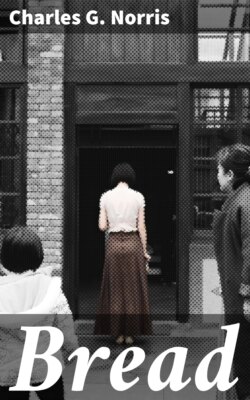Читать книгу Bread - Charles G. Norris - Страница 7
На сайте Литреса книга снята с продажи.
§ 3
ОглавлениеIn the delicatessen store she was obliged to wait her turn. The shop was well filled with late customers, and the women especially seemed maddeningly dilatory to the impatient girl.
“An’ fifteen cents’ worth of ham ... an’ some of that chow-chow ... and a box of crackers....”
Jeannette studied the rows of salads, pots of baked beans, the pickled pig’s-feet, and sausages. Everything looked appetizing to her, and the place smelled fragrantly of fresh cold meat and creamy cheeses. Most of the edibles Kratzmer offered so invitingly, she had never tasted. She would have liked to begin at one end of the marble counter and sample everything that was on it. She looked curiously at the woman near her who had just purchased some weird-looking, pickled things called “mangoes,” and gone on selecting imported cheeses and little oval round cans with French and Italian labels upon them. Jeannette wondered if she, herself, would ever come to know a time when she could order of Kratzmer so prodigally. She was sick of the everlasting struggle at home of what they should get for lunch or dinner. It was always determined by the number of cents involved.
“Well, dearie,” her mother invariably remonstrated at some suggestion of her own, “that would cost thirty cents and perhaps it would be wiser to wait until next week.”
A swift, vague vision arose of the vital years that were close at hand,—the vital years in which she must marry and decide the course of her whole future life. Was her preparation for this all-important time ever to be beset by a consideration of pennies and makeshifts?
“Vell, Miss Sturgis, vat iss it to-night?”
Fat Mrs. Kratzmer smiled blandly at her over the glass shelf above the marble counter. Jeannette watched her as she deftly crackled thin paper about the two loaves, tied and snapped the pink string. Kratzmer and his wife were fat with big stomachs and round, double chins; even Elsa Kratzmer, their daughter, who went to the High School with Jeannette and Alice, was fat and had a double chin. The family had probably all they wanted to eat and a great deal more; there must be an enormous amount of food left on the platters and dishes and in the pans at the end of each day that would spoil before morning. Kratzmer, his wife and daughter must gormandize, stuff themselves night after night, Jeannette reflected as she began to climb the four long flights of stairs to her own apartment. It was disgusting, of course, to think of eating that way,—but oh, what a feast she and Alice would have if they might change places with the trio for a night or two!
As she reached the second landing, a thick smell of highly seasoned frying food assailed her. This was the floor on which the Armenians lived, and a pungent odor from their cooking frequently permeated the entire building. The front door of their apartment was open and as Jeannette was passing it, Dikron Najarian came out. He was a tall young man of twenty-three or-four, of extraordinary swarthy beauty, with black wavy masses of hair, and enormous dark eyes. He and his sister, Rosa,—she was a few years older and equally handsome,—often met the young Sturgis girls on the stairs or fumbling with the key to the mail-box in the entrance-way below. Jeannette and Alice used to giggle sillily after they had encountered Dikron, and would exchange ridiculous confidences concerning him. They regarded the young man as far too old to be interested in either of themselves and therefore took his unusual beauty and odd, foreign manner as proper targets for their laughter.
Jeannette now instinctively straightened herself as she encountered her neighbor. Upon the instant a feminine challenge emanated from her.
“Hello,” Dikron said, taken unawares and obviously embarrassed. “Been out?”
For some obscure reason Jeannette did not understand, she elected at that moment to coquet. She had never given the young Armenian a serious thought before, but now she became aware of the effect their sudden encounter had had upon him. She paused on the lower step of the next flight and hung for a moment over the balustrade. Airily, she explained her errand to Kratzmer’s.
“What smells so good?” she asked presently.
She thought the odor abominable, but it did not suit her mood to say so.
“Mother’s cooking mussels to-night; they’re wonderful, stuffed with rice and peppers.... Have you ever tasted them? Could I send some upstairs?”
Jeannette laughed hastily, and shook her head.
“No—no,—thanks very much.... I’m afraid we wouldn’t....” She was going to say “appreciate them” but left the sentence unfinished. “I must go on up; Mother’s waiting for the bread.”
But she made no immediate move, and the young man continued to lean against the wall below her. Their conversation, however, died dismally at this point, and after a moment’s uncomfortable silence, the girl began nimbly to mount the stairs, flinging over her shoulder a somewhat abrupt “Good-night.”
